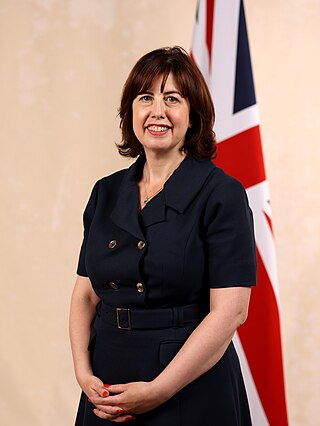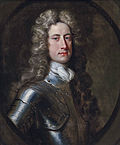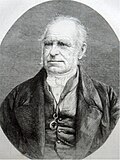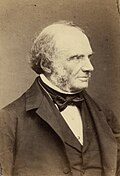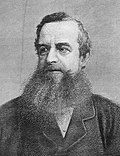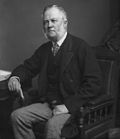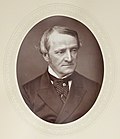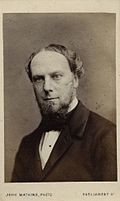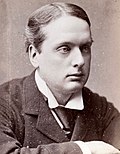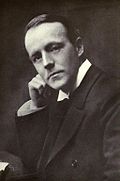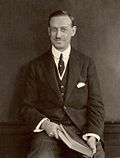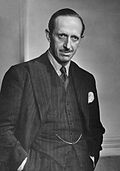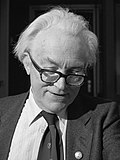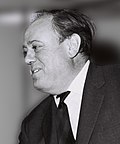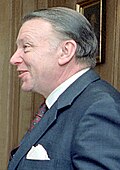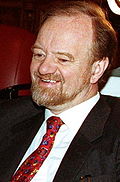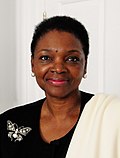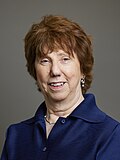Lord President of the Council
United Kingdom official position From Wikipedia, the free encyclopedia
The Lord President of the Council is the presiding officer of the Privy Council of the United Kingdom and the fourth of the Great Officers of State, ranking below the Lord High Treasurer but above the Lord Keeper of the Privy Seal. The Lord President usually attends and is responsible for chairing the meetings of the Privy Council, presenting business for the approval of the Sovereign.
This article needs additional citations for verification. (May 2010) |
| United Kingdom Lord President of the Council | |
|---|---|
 Arms used by the Privy Council Office | |
| Privy Council of the United Kingdom Privy Council Office | |
| Style | The Right Honourable |
| Type | Great Officer of State |
| Appointer | The Sovereign on advice of the Prime Minister |
| Term length | At His Majesty's pleasure |
| Formation | 1530 |
| First holder | The 1st Duke of Suffolk |
| Salary | £159,038 per annum (2022)[1] (including £86,584 MP salary)[2] |
| Website | privycouncil |
The office and its history
Summarize
Perspective
The Privy Council meets once a month, wherever the sovereign may be residing at the time, to give formal approval to Orders in Council.[3] Only a few privy counsellors need attend such meetings, and only when invited to do so at the government's request. As the duties of the Lord President are not onerous, the post has often been given to a government minister whose responsibilities are not department-specific. In recent years it has been most typical for the Lord President also to serve as Leader of the House of Commons or Leader of the House of Lords. The Lord President has no role in the Judicial Committee of the Privy Council.
In the history of British government, the President of the Council is a relatively recent creation. The first certain appointment to the office being that of the Duke of Suffolk in 1529.[4] Although there is a reference to Edmund Dudley serving as 'president of the council' in 1497, it was only in 1529 that the role was given the style and precedence of a Great Officer of State by act of Parliament (21 Hen. 8. c. 20).[5] Prior to 1679 there were several periods in which the office was left vacant. During coronations of the monarch, the Lord President carries the Sword of State.[6]
In the 19th century, the Lord President was generally the cabinet member responsible for the education system, amongst his other duties. This role was gradually scaled back in the late 19th and early 20th centuries but remnants of it remain, such as the oversight of the governance of various universities.
During times of National or coalition government the office of Lord President has sometimes been held by the leader of a minority party (e.g. Baldwin 1931–1935, MacDonald 1935–1937, Attlee 1943–1945, Clegg 2010–2015). It has been suggested that the office has been intermittently used for Prime Ministerial deputies in the past.[clarification needed][7][8]
A particularly vital role was played by the Lord President of the Council during the Second World War. The Lord President served as chairman of the Lord President's Committee. This committee acted as a central clearing house which dealt with the country's economic problems. This was vital to the smooth running of the British war economy and consequently the entire British war effort.
Winston Churchill, clearly believing that this wartime co-ordinating role was beneficial, introduced a similar but expanded system in the first few years of his post-war premiership.[9] The so-called 'overlord ministers' included Frederick Leathers as Secretary of State for the Co-ordination of Transport, Fuel and Power and Lord Woolton as Lord President. Woolton's job was to co-ordinate the then separate ministries of agriculture and food.[10] The historian Lord Hennessy of Nympsfield quotes a PhD thesis by Michael Kandiah saying that Woolton was "arguably the most successful of the Overlords" partly because his ministries were quite closely related; indeed, they were merged in 1955 as the Ministry of Agriculture, Fisheries and Food.[11]
On several occasions since 1954, non-British Ministers have served briefly as acting Lords President of the Council, solely to preside over a meeting of the Privy Council held in a Commonwealth realm.[12][13][14] Examples of this practice are the meetings in New Zealand in 1990 and 1995, when Geoffrey Palmer and James Bolger respectively were acting Lords President.
Andrea Leadsom's appointment in June 2017 was the first in some time where the post holder was not a full Cabinet member.[15]
Role and responsibilities
Summarize
Perspective
Routine functions
"The Privy Council is the mechanism through which interdepartmental agreement is reached on those items of Government business which, for historical or other reasons, fall to Ministers as Privy Counsellors rather than as Departmental Ministers."[16]
The routine functions of the lord president are as follows:
- Preside at Privy Council meetings, including any emergency meetings, and attend to both ministerial correspondence and parliamentary questions relating to Privy Council business.[17]
- Consider for approval prerogative and statutory Orders in Council.[18] Prerogative orders deal with the basic functioning of the British state and are thus applicable under a number of circumstances, including but not limited to the prorogation of Parliament, the granting, amendment, and revocation of royal charters, the appointment of high sheriffs, or the governance of British Overseas Territories.[19][20][21][22] On the other hand, statutory orders are a form of delegated legislation conferred on His Majesty's Government by Parliament for the purposes of creating detailed regulations through rulemaking.[23] Unlike prerogative orders, statutory Orders in Council are subject to parliamentary scrutiny.[24] As a consequence, most Orders in Council operate on statutory footing as opposed to the common law authorities conferred by the royal prerogative.[25]
- Consider for approval Orders of Council concerning various matters of state, namely appointments to and regulation of professional bodies and institutions of higher education. Unlike Orders in Council which are enacted by the sovereign on the advice of the Privy Council, Orders of Council are enacted by the Privy Council itself pursuant to statutory authority conferred by Parliament.[26][27][28]
- As a member of the Privy Council's Committee for the Affairs of Jersey and Guernsey, review laws passed by the bailiwicks of Jersey and Guernsey, and make recommendations to the sovereign concerning their approval.[29][30]
Visitorial functions
In addition to his or her routine functions, the lord president also serves as the visitor for several English universities, including:[31]
- University of Birmingham
- University of Bristol
- University of Hull
- Imperial College London
- Keele University
- University of Leeds
- University of Leicester
- University of Liverpool
- University of London (but not King's College London or University College London)
- University of Nottingham
- University of Reading
- University of Sheffield (but not Sheffield Hallam University)
- University of Southampton
- University of Sussex
- University of Wales
Partial list of Lords President of the Council
Lords President of the Council (c. 1530–1702)
| Lord President | Term of office | ||
|---|---|---|---|
 |
Charles Brandon 1st Duke of Suffolk |
1530 | 14 August 1545 |
 |
William Paulet 1st Marquess of Winchester |
January 1546 |
February 1550 |
 |
John Dudley 1st Duke of Northumberland |
February 1550 |
July 1553 |
 |
Henry Montagu 1st Earl of Manchester |
September 1621 |
July 1628 |
 |
James Ley 1st Earl of Marlborough |
July 1628 |
14 December 1628 |
 |
Edward Conway 1st Viscount Conway |
14 December 1628 |
3 January 1631 |
 |
Anthony Ashley-Cooper 1st Earl of Shaftesbury |
21 April 1679 |
15 October 1679 |
 |
John Robartes 1st Earl of Radnor |
24 October 1679 |
24 August 1684 |
 |
Laurence Hyde 1st Earl of Rochester |
24 August 1684 |
18 February 1685 |
 |
George Savile 1st Marquess of Halifax |
18 February 1685 |
4 December 1685 |
 |
Robert Spencer 2nd Earl of Sunderland |
4 December 1685 |
October 1688 |
 |
Richard Graham 1st Viscount Preston |
October 1688 |
December 1688 |
 |
Thomas Osborne 1st Duke of Leeds [nb 1] |
14 February 1689 |
18 May 1699 |
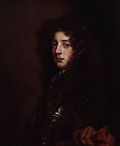 |
Thomas Herbert 8th Earl of Pembroke |
18 May 1699 |
29 January 1702 |
 |
Charles Seymour 6th Duke of Somerset |
29 January 1702 |
13 July 1702 |
Lords President of the Council (1702–present)
- Marquess of Carmarthen from 1689, created Duke of Leeds in 1694
- Served as Secretary of State for the Northern Department from February 1721
- Served as Secretary of State for the Northern Department from November 1744
- Lord Lieutenant of Ireland from December 1750
- Baron Camden from 1765; created Earl Camden and Viscount Bayham in 1786[32]
- Lord Privy Seal until February 1798
- Earl of Ripon and Earl de Grey from 1859; created Marquess of Ripon in 1871[33]
- Served Leader of the House of Lords until August 1876
- Served as Lord Lieutenant of Ireland from May 1882
- Served as Lord Privy Seal until March 1885
- Served as Secretary of State for War from January 1886
- Served as President of the Board of Education March 1900 – July 1902
- Served as Leader of the House of Lords from July 1902
- Served as Secretary of State for India March 1911– May 1911
- Served as President of the Board of Trade from August 1916
- MP for City of London until 1922; thereafter created Earl of Balfour and Viscount Traprain and joined the House of Lords[34]
- Served as Chancellor of the Duchy of Lancaster until May 1923
- Served as Lord Privy Seal September 1932 – December 1933
- Served as Secretary of State for Foreign Affairs from February 1938
- MP for Lewisham East until 1950; MP for Lewisham South thereafter.[36]
- Viscount Hailsham until 1963 when disclaimed under the Peerage Act 1963; returned to Parliament as MP for St. Marylebone in 1963[37]
- Served as Leader of the House of Lords until October 1963
- Served as Minister for Science from October 1963 – April 1964
- Served as Secretary of State for Education and Science from April 1964
- With special responsibility for political and constitutional reform
Timeline

See also
References
Wikiwand - on
Seamless Wikipedia browsing. On steroids.
